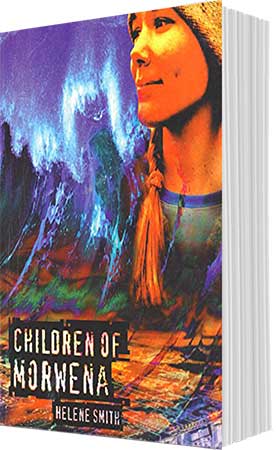As we lay down on the bare ground, the night closed in and I felt Emily secretly cringing.
She whispered, ‘I wish…I wish we had a lantern.’
‘There’s nothing here to hurt us,’ I said, ‘nothing but the river and the trees.’
‘And the sky,’ Emily ventured. ‘I can see the morning star.’
Together we sang softly, an old old chant that had come down to us through the centuries.
Moon light, star bright.
I wish I may, I wish I might,
Have the wish I wish tonight.
At last Emily’s breathing evened out and I held my hat against my cheek. To soothe myself I imagined myself at home in the garden planting things. The black soil of the flood plain came easily. But the sea…I must not allow myself to think of the sea. Page 72-73.

Leila has the seeds her mother has given her. She has her velvet hat and an iron will inherited from her father. But are these enough to overcome the odds when she is flung into a world of chaos and loss in the aftermath of a war strike against her beloved city of Morwena?
Leila dreams of finding sweet water and planting a garden but she makes an unshakable pact with herself to find Bonnie. Will her obsession with finding Bonnie destroy any chance of a normal life? What of her friendship with Emily and her soul mate Jake who would give her love? What of the handsome Stefan whose intellect and charm attract her?
Andre songs bring light to the darkness and give him the will to go on, but why has his Zara the beautiful drummer girl turned away from him? And who is the Rick who has taken her away from him? Is the likeable youth worker offering Andre real work and a chance for him to be reunited with his sisters, Leila and Bonnie? Or will Rick lead him into a strange web of intrigue, of deceit and betrayal?
Bonnie has her feather quilt but no voice. No voice for the people who rescue her. In her inner sea of loneliness and longing she remembers the song her mother sang and the arms of a loving family but is it enough to give her back the will to live?
Can her feisty companion – a boy called Tyke, half brother to Zara, lead her to a safer place? Or will the children perish?
This is the story of three siblings, their loves, their hates, their dreams and disappointments, their sorrows and their joys as they search for each other and attempt to build a life with their peers and to find an authentic place with their fellow citizens in Westland.
Suggested Activities for Writers
If you would like to try some writing activities that relate to a story like Children of Morwena, feel free to try some of the suggestions in Helene Smith’s Writer’s Notebook for Children of Morwena.
From the Author
Every day in the summer before I began this story I saw them on the river near my home: children swinging across the water and leaping from a rope they had tied to a tall river gum or diving from a sheoak. Perching on the branches they adorned the tree like so many birds.
Full of laughter and banter, the young voices echoed across the water. Their joy in the moment was beautiful and I couldn’t help wondering what their futures would be. At that time five years before the story was published in 2002, every night on television, there came the shocking images of children, orphaned by war, fleeing from their homelands that no longer offered them security or comfort. In spite of international aid, they had to survive on their own, relying on each other and their own wits. Since that date there have been countless other instances of children left to fend for themselves after war or natural disasters – tsunamis, earthquakes, hurricanes, floods. It sometimes takes years before their stories are told.
Teenagers, Leila, Andre and their young sister, Bonnie are children of the future who live in an imaginary land called Westland but they are the children on the river. They are the children of Africa, Bosnia, Lebanon, Israel, Afghanistan and Iraq. They live in the present day. They could be children of the future. They are precious.
Reviews
Smith creates a unique post-apocalyptic world …the novel’s strength lies in the exploration of what it means to belong. Ronda Poultney- Viewpoint
An empowering story, cosmic in concept, symbolic of those issues which threathen the healthy survival of young people. This gripping tale captures the reader’s soul. Essential reading for every adolescent facing the 21st Century. Doctor Patricia Sherwood in Viewpoint